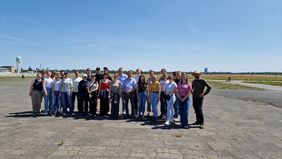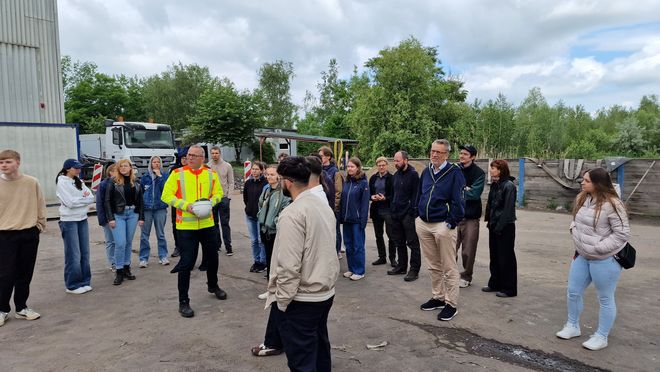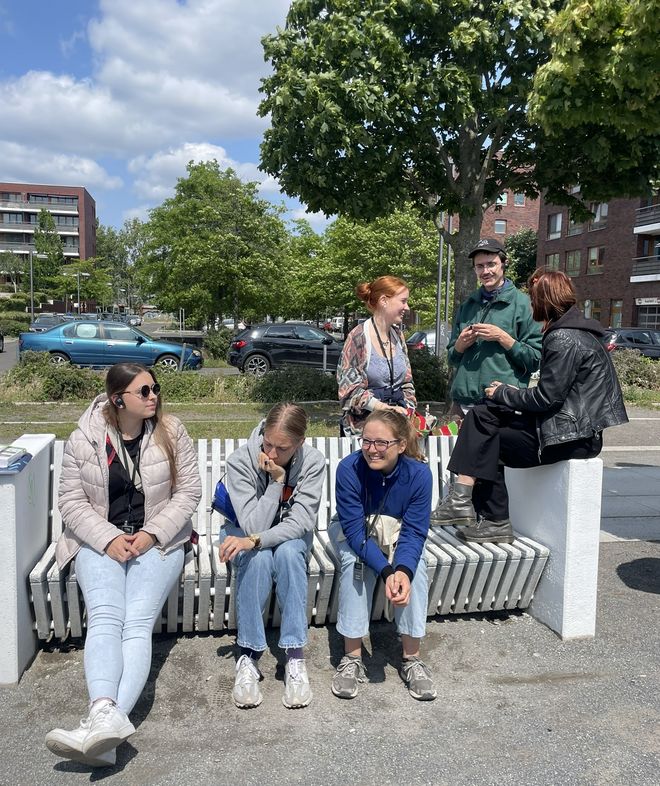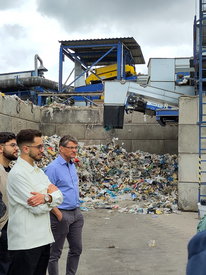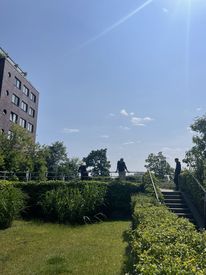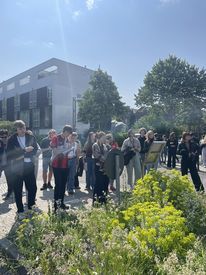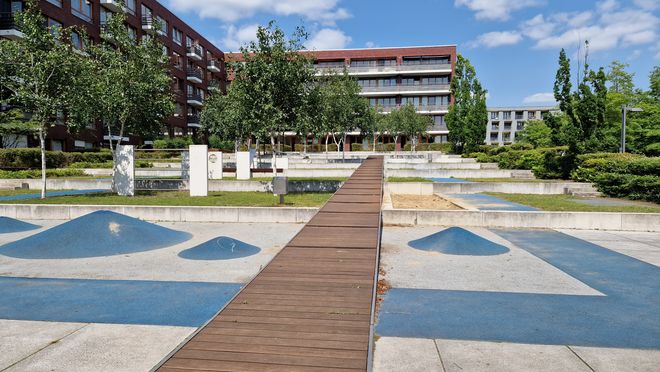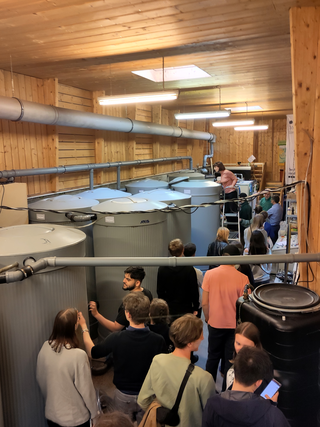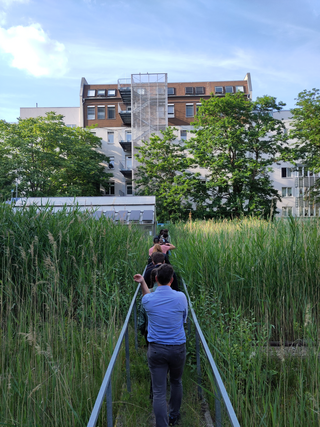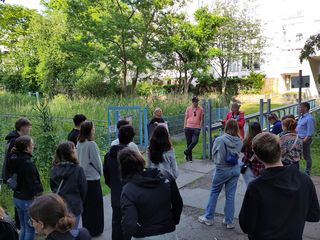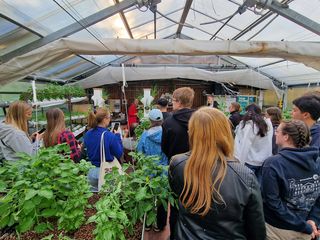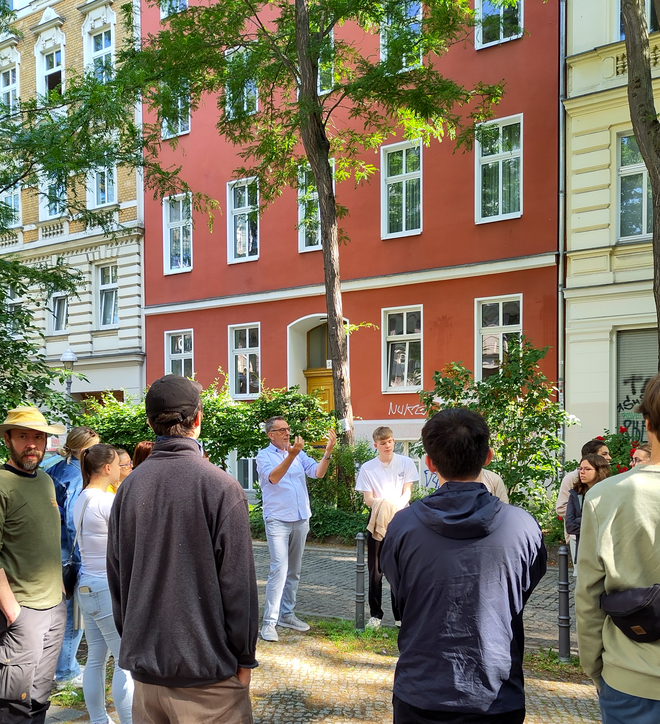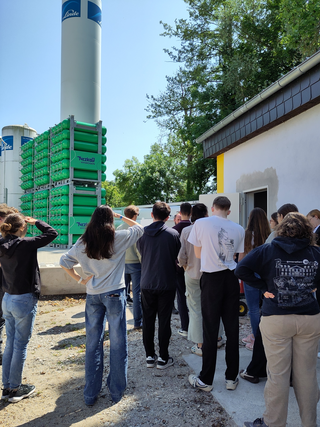b.is Heads to the Capital – Two Days of Excursion Week
Once again this year, a successful excursion took place as part of the Faculty of Civil and Environmental Engineering’s Excursion Week. The four chairs of the b.is Institute jointly offered an engaging two-day program focusing on critical infrastructure in the areas of resource, water, and energy management, as well as transportation systems planning.
The excursion kicked off early on the morning of June 11, 2025. At 7:00 a.m., the bus departed from the Catholic Church in Weimar with 30 participants on board. The group mainly consisted of students from environmental and civil engineering, with a few participants from construction management.
The originally planned first stop close to Leipzig had to be changed on short notice. Therefore, the group visited the residual waste treatment plant (in German: Restabfallbehandlungsanlage / RAB) near Halle-Lochau instead. A change of plans that turned out to be a fortunate one. The site was equally impressive, including a landfill and a sewage sludge mono-incineration plant besides the residual waste treatment plant. During the guided tour at the RAB, the challenges posed by the improper disposal of batteries in residual waste became especially clear. As mentioned by the plant manager several fires are prevented at the facility every week. Incidents that pose an existential threat to the plant. Another experience, that left a lasting expression to the students, was the large volume of plastic waste which ended up being incinerated instead of being recycled via the designated yellow bag system.
The journey then continued toward Berlin, where a diverse program awaited with two main themes: water management and urban development. The first stop in the capital was the sponge city neighborhood of Rummelsburger Bucht. After an adventurous bus maneuver and under perfect weather conditions, participants were guided through the area. There, they could see firsthand how urban green spaces and retention systems such as swales and infiltration trenches contribute to climate adaptation. The goal of these developments is to create climate-resilient urban spaces that reduce heat islands by promoting shading and evapotranspiration through the vegetation. On this summer day, the positive impact on life quality was clearly noticeable.
After that, the group visited Block 6, a site where decentralized greywater treatment technologies are implemented for households. The reclaimed water is of near-bathing quality and is being reused as domestic water, e.g. for toilet flushing. The final stop of the day was the ROOF WATER FARM, a pilot project located in the courtyard of Block 6. Contrary to initial assumptions of some students, it is not a farm located on a rooftop, but rather a system that uses rainwater for agricultural production. The project focuses on aquaponic and hydroponic systems operated with treated greywater and rainwater. It presents innovative solutions for sustainable water management in densely populated urban areas. As a special treat, students even had the opportunity to sample fresh herbs grown in the on-site greenhouse.
Enriched by the many impressions, the group checked into the A&O Hostel in the evening. After a late dinner, the day concluded with a relaxed gathering at a nearby beer garden.
The second day began a little later than planned, much to the delight of the night owls in the group. The day’s focus was urban transportation planning in Berlin. On a walking tour through several residential neighborhoods, students were introduced to a variety of traffic calming strategies. These included dedicated bike streets, low-traffic zones, and strategically placed roadblocks that restrict motor vehicle access while maintaining accessibility for cyclists and pedestrians. With a healthy dose of academic curiosity, the group explored these simple yet effective design interventions on foot, ending the walk at the site of the former Tempelhof Airport. The vast field there, currently used as public open space, remains the subject of heated debate. On-site, students were invited to discuss the many challenges and opportunities surrounding its future use, particularly addresing the tension between housing demand, the preservation of open space, and the site's historic significance.
The final stop of the excursion was the WTZ Roßlau research center near Dessau. Specializing in engine development, the institute is actively researching CO₂-neutral fuels, with a particular focus on hydrogen and electrolysis processes. In partnership with the Chair of Energy Systems at Bauhaus-Universität Weimar, WTZ Roßlau is currently developing a concept for a carbon-neutral energy supply for the surrounding industrial area. The project incorporates smart control systems, energy storage solutions, and innovative hydrogen applications.
With this hands-on insight into the future of sustainable energy systems, the excursion came to a close. The group then made their way back to Weimar. Returning not only with valuable technical knowledge and new perspectives for their studies and careers, but also with a strengthened sense of interdisciplinary exchange.

